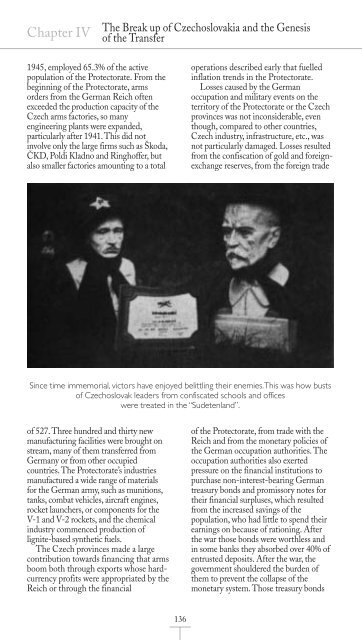the nationality of all inhabitants of the czech provinces and ...
the nationality of all inhabitants of the czech provinces and ...
the nationality of all inhabitants of the czech provinces and ...
Create successful ePaper yourself
Turn your PDF publications into a flip-book with our unique Google optimized e-Paper software.
Chapter IV<br />
1945, employed 65.3% <strong>of</strong> <strong>the</strong> active<br />
population <strong>of</strong> <strong>the</strong> Protectorate. From <strong>the</strong><br />
beginning <strong>of</strong> <strong>the</strong> Protectorate, arms<br />
orders from <strong>the</strong> German Reich <strong>of</strong>ten<br />
exceeded <strong>the</strong> production capacity <strong>of</strong> <strong>the</strong><br />
Czech arms factories, so many<br />
engineering plants were exp<strong>and</strong>ed,<br />
particularly after 1941. This did not<br />
involve only <strong>the</strong> large firms such as Škoda,<br />
ČKD, Poldi Kladno <strong>and</strong> Ringh<strong>of</strong>fer, but<br />
also sm<strong>all</strong>er factories amounting to a total<br />
<strong>of</strong> 527. Three hundred <strong>and</strong> thirty new<br />
manufacturing facilities were brought on<br />
stream, many <strong>of</strong> <strong>the</strong>m transferred from<br />
Germany or from o<strong>the</strong>r occupied<br />
countries. The Protectorate’s industries<br />
manufactured a wide range <strong>of</strong> materials<br />
for <strong>the</strong> German army, such as munitions,<br />
tanks, combat vehicles, aircraft engines,<br />
rocket launchers, or components for <strong>the</strong><br />
V-1 <strong>and</strong> V-2 rockets, <strong>and</strong> <strong>the</strong> chemical<br />
industry commenced production <strong>of</strong><br />
lignite-based syn<strong>the</strong>tic fuels.<br />
The Czech <strong>provinces</strong> made a large<br />
contribution towards financing that arms<br />
boom both through exports whose hardcurrency<br />
pr<strong>of</strong>its were appropriated by <strong>the</strong><br />
Reich or through <strong>the</strong> financial<br />
The Break up <strong>of</strong> Czechoslovakia <strong>and</strong> <strong>the</strong> Genesis<br />
<strong>of</strong> <strong>the</strong> Transfer<br />
136<br />
operations described early that fuelled<br />
inflation trends in <strong>the</strong> Protectorate.<br />
Losses caused by <strong>the</strong> German<br />
occupation <strong>and</strong> military events on <strong>the</strong><br />
territory <strong>of</strong> <strong>the</strong> Protectorate or <strong>the</strong> Czech<br />
<strong>provinces</strong> was not inconsiderable, even<br />
though, compared to o<strong>the</strong>r countries,<br />
Czech industry, infrastructure, etc., was<br />
not particularly damaged. Losses resulted<br />
from <strong>the</strong> confiscation <strong>of</strong> gold <strong>and</strong> foreignexchange<br />
reserves, from <strong>the</strong> foreign trade<br />
Since time immemorial, victors have enjoyed belittling <strong>the</strong>ir enemies.This was how busts<br />
<strong>of</strong> Czechoslovak leaders from confiscated schools <strong>and</strong> <strong>of</strong>fices<br />
were treated in <strong>the</strong> “Sudetenl<strong>and</strong>”.<br />
<strong>of</strong> <strong>the</strong> Protectorate, from trade with <strong>the</strong><br />
Reich <strong>and</strong> from <strong>the</strong> monetary policies <strong>of</strong><br />
<strong>the</strong> German occupation authorities. The<br />
occupation authorities also exerted<br />
pressure on <strong>the</strong> financial institutions to<br />
purchase non-interest-bearing German<br />
treasury bonds <strong>and</strong> promissory notes for<br />
<strong>the</strong>ir financial surpluses, which resulted<br />
from <strong>the</strong> increased savings <strong>of</strong> <strong>the</strong><br />
population, who had little to spend <strong>the</strong>ir<br />
earnings on because <strong>of</strong> rationing. After<br />
<strong>the</strong> war those bonds were worthless <strong>and</strong><br />
in some banks <strong>the</strong>y absorbed over 40% <strong>of</strong><br />
entrusted deposits. After <strong>the</strong> war, <strong>the</strong><br />
government shouldered <strong>the</strong> burden <strong>of</strong><br />
<strong>the</strong>m to prevent <strong>the</strong> collapse <strong>of</strong> <strong>the</strong><br />
monetary system. Those treasury bonds


